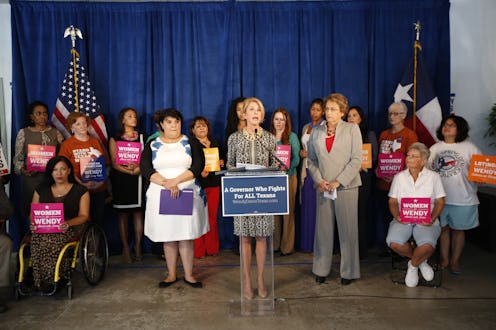News
Abortion Could Be Heard By SCOTUS Again
And here we are again. Two years following Wendy Davis's heroic 12-hour filibuster, Texas is back in the spotlight of abortion news — and in the U.S. Supreme Court — and time is of the essence. Texas' abortion law faces a possible Supreme Court hearing, and unless the nine justices step in, 10 clinics will close by July 1, leaving just nine facilities remaining in the state. The Supreme Court faces an emergency appeal from Texas-based abortion providers asking them to strike down provisions of a state law that continues to place restrictions on clinics. If the justices choose to hear the story, the decision should come in the middle of this upcoming election, which could strike a crucial chord for the 2016 election season.
Last year, Guttmacher Institute released reports that abortion rates are at an all-time low since 1973, having dropped 13 percent from 2008 to 2011 to a rate of 16.9 abortions per 1,000 women aged 15-44. A number of clinics have shut their doors because of restrictive legislation, which is only increasing. Texas ranks as one of the most restrictive states by the Guttmacher Institute, and just this year, the state imposed several new restrictions on its women. These provisions included requiring a woman to attend state-directed counseling and to wait 24 hours before undergoing a procedure. A woman must undergo an ultrasound and receive a full description of the procedure. Texas also requires parental consent before an abortion for girls under the age of 18, and public funding for abortion procedures is only available in the cases of rape or incest. These are restrictions that have been in effect since Jan. 13, 2015.
If the Supreme Court decides to take on this key issue, debates in the election season are sure to be shaped on the topic. Here are three reasons why 2016 might become a hotbed election for abortion debate, regardless of how Texas tackles the emergency appeal.
Democrats Will Have A Lot To Say
Hillary Clinton has garnered a lot of attention as a Democratic front-runner and is not afraid to discuss her stance on abortion. After Republican House members passed a bill banning abortion after 20 weeks, the Clinton campaign stated that "politicians should not interfere with personal medical decisions," reported The Hill. The progressive Bernie Sanders has long expressed his views on a woman's right to choose and has voted no on several restrictive bills. According to LifeNews.com, Sanders voted for 6 percent of these. With abortion being heard in the Supreme Court, leading Democratic voices are sure to raise their voices even louder.
Republicans Won't Back Down
The declared candidates so far in the GOP ring have also taken very strict stances on abortion — no surprise here. Former Florida governor Jeb Bush signed into law a February 2007 bill that required parental consent for abortion and also supported a specialty "choose life" license plate, according to Ballotpedia. The Huffington Post declared him "to the right" of his brother, former President George W. Bush, on the issue of abortion. Considering George W.'s well-known pro-life stance, that's saying a lot. Texas Sen. Ted Cruz isn't much better, having declared that pro-choice legislation is "the real war on women." And if the topic takes top billing in the Supreme Court, the ridiculous statements might just keep getting more ridiculous on the Republican side.
More Women Will Face Restrictions In The Meantime
As candidates debate and Supreme Court Justices decide on which cases to hear, the 2016 election will also coincide with continued restrictive laws across the United States. Guttmacher Institute reported that 332 provisions had been proposed by April 2015, which is 32 percent of the 791 sexual and reproductive health rights bills passed this year. From Kansas to Arkansas and back to Texas again, women face constant threats to their reproductive rights and their access to abortion clinics. The Supreme Court's stance will surely have an effect on the 2016 banter, but women's right to choose will hang in the balance.
Images: Getty Images (3)
